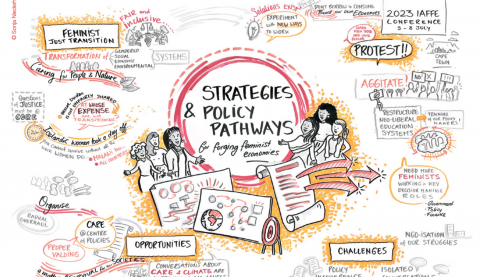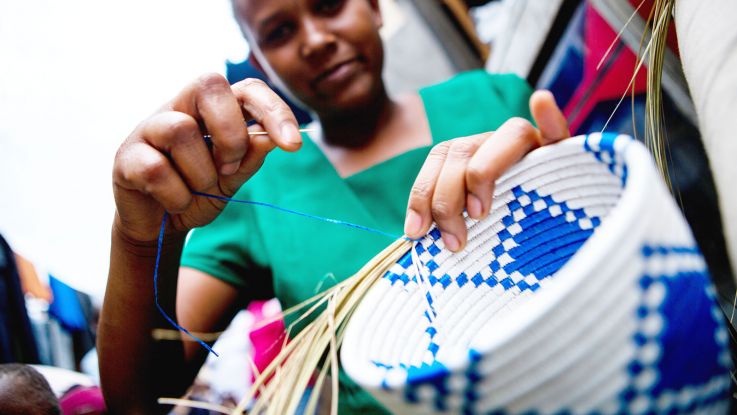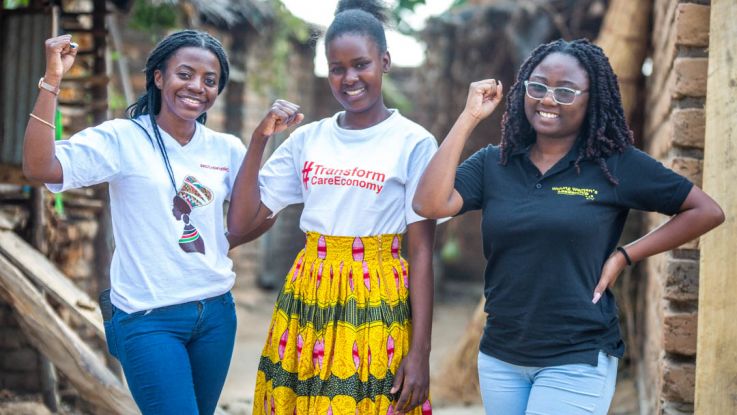Demanding women's economic justice at the UN
29 April 2024
Each year, the UN Commission on the Status of Women convenes in New York, drawing policymakers, activists, and organisations like ActionAid to advocate for feminist economic alternatives and global gender equality. Find out what we achieved this year.

Imagining Feminist Wellbeing Economies in Malawi and beyond report cover. . Photo: Sonja Niederhumer/ActionAid
Every year, policymakers, civil society organisations, multilateral organisations and governments gather in New York for the UN Commission on the Status of Women (CSW) to discuss how best to achieve gender equality and assess progress - or not!
During the two-week event, member states work together to produce an ‘outcome’ document, which provides a guide for the work governments will do together to achieve gender equality and in line with this year’s theme, strengthen funding for this.
This year was a key opportunity to push ActionAid’s work such as the social organisation of care, addressing structural violence, gender-transformative public services and social protection, decent and dignified work and public financing, including anti-austerity, anti-privatisation, tax and debt justice efforts.
While there were important wins, there is still much to be done to incorporate a holistic approach to economic justice for women and girls worldwide, as multiple crises deepen.
ActionAid at CSW
Alongside feminist movements and women’s rights organisations, ActionAid has long called for feminist economic alternatives that prioritise wellbeing, human rights and climate justice. In the formal UN space and the civil society space, ActionAid joined calls for structural change.
In both spaces feminist activists and academics from all corners of the globe highlighted how the current neoliberal economic system is undermining the rights of women and girls while shrinking public investments and infrastructure under a blind pursuit of economic growth. It is a system that reproduces inequalities and injustices rooted in colonialism and racism, within a global financial architecture that remains undemocratic, unrepresentative and unaccountable
The current economic system undervalues women’s paid and unpaid care work, while enabling private companies, international financial institutions and others to harm women and girls through a focus on privatisation and deregulation. ActionAid joined a movement of civil society organisations demanding to rebuild the social organisation of care and revolutionise gender-responsive public services for economic transformation.
Imagining fairer, feminist economic alternatives
Alongside colleagues from Kenya, Ghana, South Africa and Malawi from the Young Urban Women’s programme and ally organisations – we hosted panel events and meetings to tell decision-makers about key asks and alternatives for change. Young women are calling on their governments and international financial institutions to urgently adopt feminist wellbeing approaches to the economy.
As such, they are advocating for economic transformation that puts women’s rights and gender equality at the heart of macroeconomic decisions including budgeting decisions and the provision of universally available, high quality public services.
They are also calling for progressive forms of tax to clamp down on tax avoidance and evasion. Crucially, young women across these countries are calling for a transformation of the global financial architecture, including greater transparency in decision making and accountability from international financial institutions and their parliamentarians and governments.
Feminist movements and women rights organisations around the world continue to disrupt narratives around the current economic system and CSW was no exception.
Major gaps were highlighted along with alternatives to greater transformation to hold international, regional and national decision makers to account.
What was decided at CSW and what next?
A bold change of direction is needed from nearly every government to achieve the kind of change we are seeking at the global, regional and national level.
Governments urgently need to take a feminist approach – including through recognising the foundational role of women’s unpaid care and domestic work; reform of economic policies like trade, taxation and debt, and supporting women’s access to dignified working conditions.
While we celebrate the agreed conclusions' calls to transform the international financial architecture as well as specific mentions of tax and debt justice, there is still much to do if we are to achieve real transformation.
In particular, we call for an approach that includes other key areas such as trade and strengthens linkages with climate justice and sexual and reproductive health and rights.
Similarly, real commitment is to be seen through the adequate implementation of the agreed actions.
ActionAid will continue to call on governments – including the UK Government – to take a feminist economic approach domestically and abroad, to pursue economies rooted in solidarity, justice and the wellbeing of humans and the planet.
Read more about our work on women’s economic justice:



